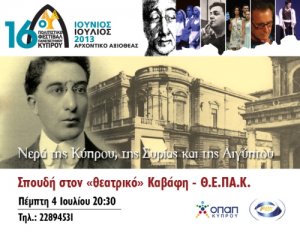Waters of Cyprus, of Syria, and of Egypt

Participating in the events commemorating the 150th anniversary of the birth of the paramount poet of Greater Hellenism, C. P. Cavafy, the Theatrical Workshop of the University of Cyprus presents a performance based on the study of the dramatic Cavafy.
The term “dramatic” refers to those poems or parts of poems in which the Alexandrian makes use of elements and techniques typical for the dramatic art.
More specifically, these include:
(a) purely dramatic/dialogic poems (for example, “The Poet and the Muse”, “Displeased Theatregoer”);
(b) poems that constitute dramatic monologues, i.e. consist entirely of a monologue whose addressee, either named or unnamed, is present on stage (for example, “Alexandrian Merchant”, “A Great Feast at the House of Sosibius”, “Homecoming from Greece”, “Simeon”, “Philhellene”, “The Glory of the Ptolemies”, and others);
(c) poems that constitute dramatic monologues, encased in narratives (for example, “The Battle of Magnesia”, “In Sparta”, “Come Now, King of the Lacedaemonians”, and others);
(d) poems structured as epitaphs in which we have the first person account of a dead youth who often addresses a particular recipient (“Epitaph”, “Tomb of Iases”, “Tomb of Ignatius”, “Tomb of Lanes”, etc.);
(e) poems containing internal monologues (for example, “Since Nine―”, «Ο “The Afternoon Sun”, “Gray”, “Far Off”, “Aboard the Ship”, and others);
(f) poems structured as Choruses (for example, “Ancient Tragedy”, “The Naval Battle”, “Trojans”, “In 200 B.C.”, “On the Outskirts of Antioch”, and others);
The approach takes into account the different stages in Cavafy’s development as a poet (early, formative, mature), as well as the thematic areas of his poetry (philosophical/ didactic, historical/political, sensual/erotic poems). The poet’s translations are also considered as part of his oeuvre, regardless of whether they have resulted in a new poem of his own (“A Love”, “Correspondences According to Baudelaire”), or have remained fragmented exercises of his essayistic thinking (for example, translations from Dante’s “Inferno”, Shakespeare’s “Measure of Measure”, Keats’ “Lamia” or Tennyson’s “Ulysses”).
The performance seeks to highlight, in a coherent theatrical act, Cavafy’s documented knowledge of and love for the theatre and the dramatic art, emphasising those elements which the Alexandrian assimilated from the art of drama – ancient, medieval and contemporary, as well as from major European poets whose poetics were also based in part on the dramatic art (for example, Robert Browning and his use of dramatic monologues).
In Cavafy’s dramatic monologues, the speaker, the dramatic persona, addresses a named, yet silent recipient (typical examples include the philosopher Hermippus in the poem “Homecoming from Greece”, the courtier Sithaspes in “Philhellene”, the poet Mebes in “Simeon”), or sometimes an anonymous addressee hidden behind vocatives such as “Friends”, “You”. A marginal case is the poem “Dünya Güzeli” in which the recipient of the “World Beauty’s” dramatic monologue is her own reflection in the mirror.
Finally, it should be noted that the experience of approaching Cavafy’s dramatic poems convinced us in the validity of G. P. Savvides’ observation that: “his dramatic instinct and his love for the theatre, its environment, works and people, which has been attested in several of his poems, as well as in two early articles about Shakespeare, allow us to speculate that in a society more closely related to the theatre, Cavafy would have probably turned to this literary genre” (Mikra Kavafika, vol. B, p. 44).
Text selection, adaptation and stage direction: Michalis Pieris
Music: Evagoras Karagiorgis
Set and costumes: Kypros Georgiou, Anna Kyriazi
Lighting design: Carolina Spyrou
Production manager, assistant director: Stamatia Laoumtzi
When
Where
Old Nicosia
Cost
€10 regular / €5 reduced
Event Tools
Share this Event
Save to Your Calendar
Note: While every care has been taken to ensure the information provided is accurate, we advise you to check with the event organisers before travelling to confirm the details are correct.


